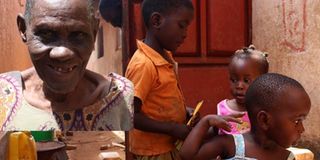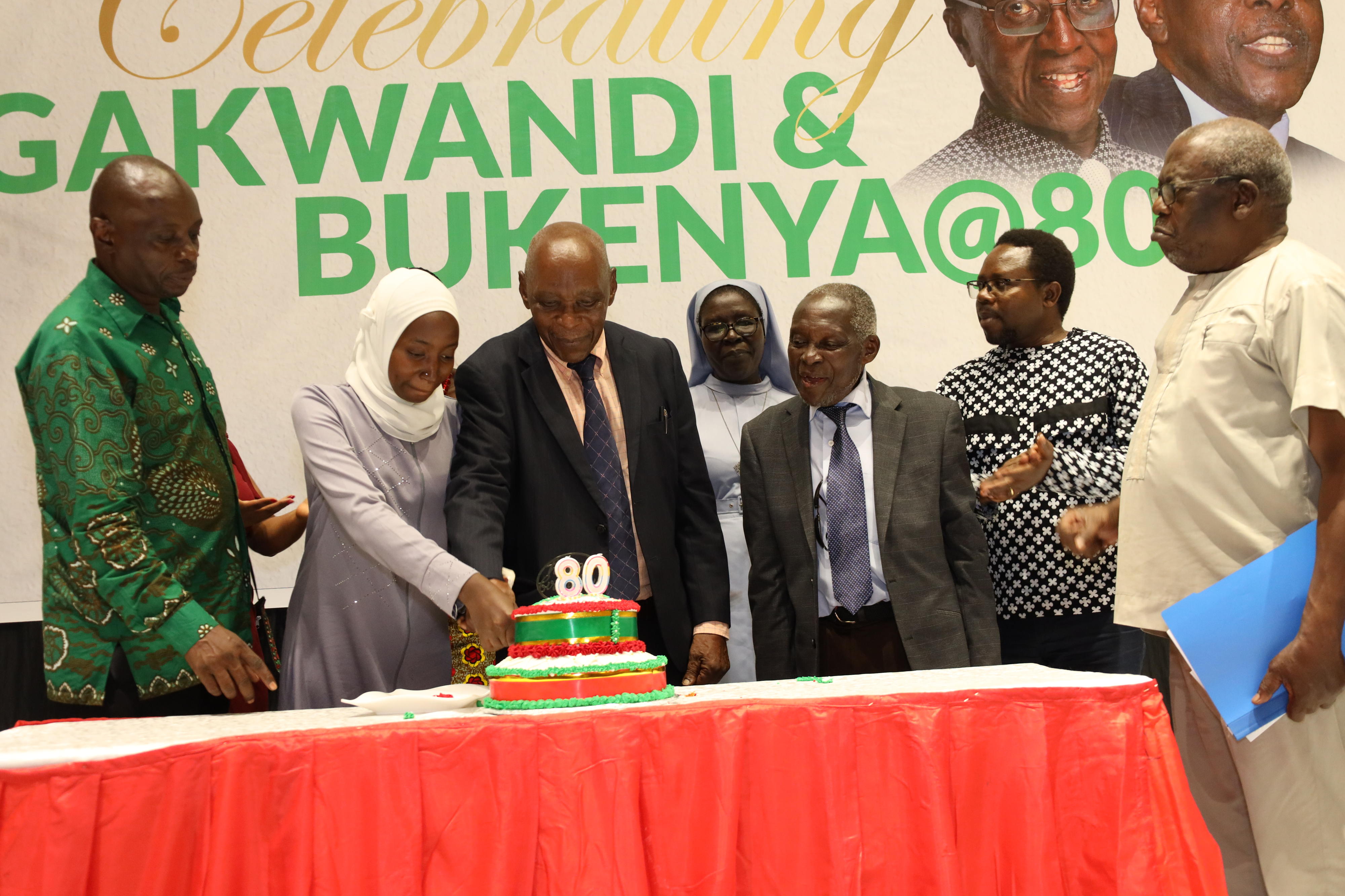A grandmother who raises orphans

Nakala Saye looks after children in the neighbourhood for a small fee. PHOTO BY AMELIA HERRICK
What you need to know:
- Saye’s biggest challenge is having enough food for everyone. When she has money, she goes to the market a few hundred metres away, but she never crosses the road.
- Pina works mainly with HIV positive youth and aims to empower them and the adults who care for them.
In a slum behind shops on Entebbe Road lives Nakala Saye. She wears long dresses with a single black bangle on her left wrist. Her hair is only a few centimetres long. Her hands are worn and rough from years of working. Her wrinkles are deep, but there are also permanent lines from smiling. She is missing her two front teeth, but her voice can still be heard over the buzz of Entebbe Road as she reprimands the children.
As she walks around her small compound on Kampala’s south side, children, like ducklings following their mama, follow her.
A helping hand
Grandparents raise 70 per cent of the orphans in Uganda: Saye is one of those grannies. Saye, like most grandmothers, finds it hard to provide for her children and relies on non-governmental organisations, such as the People in Need Agency (PINA) for food and medicine. NGOs mainly focus on children affected by the HIV/Aids epidemic, but grandmothers also benefit from these organisations. Saye greets Pina’s, Asia Namusoke Mbajja with such gratitude that she fell at her feet during a recent visit. Saye’s smile lines would not be there if it were not for people like Mbajja.
Saye, who believes she is around 70, has lived in her one bedroom house next to a few of her siblings for about 10 years. She used to till the fields, but her age and health forced her out of that work.
Unforeseen responsibility
She never married and has no children of her own. It was not until the death of her sister from HIV/Aids that she was left with a child. The HIV/Aids epidemic has left 1.1 million children orphaned. With the death being in her home it was assumed that she would care for the one-year-old HIV positive Futumah Nantumbwe. Nantumbwe, who is now, 10 has been under Saye’s care ever since.
Unable to hold a job that required her to leave the house, Saye started babysitting to make an income. Currently, she watches Habiba, Barbara Ronia and Abdu Ssemuga. The girls come and go each day as their parents drop them off in the morning and pick them up in the evening except for Semuga.
One day about three years ago, his parents dropped him off but never picked him up. She says she is now stuck with him because there is nowhere she can leave him. She also watches countless family members each day without pay. She makes about Shs1,000 a day from childcare, sometimes more if the parent finds her work exceptional that day.
Surviving day by day
Saye’s biggest challenge is having enough food for everyone. When she has money, she goes to the market a few hundred metres away, but she never crosses the road. If she needs something from the opposite side, neighbours will fetch it for her because she and Nantumbwe find it too dangerous to cross the busy Entebbe Road. Saye only goes to the market so she can benefit from the relationships she has formed from the shop owners. Sometimes the money is not enough and Saye has to beg.
Saye’s fondest memory was a few years back before she learned about Pina. She visited her now late mother in Jinja for a family gathering and experienced the generosity of the community. She feels that same generosity with Pina.
Pina locates children in need, posts each child’s story on their Facebook page and asks for online donations.
A German who visited Uganda recently and met the family donated to Saye and Nantumbwe because she was moved by their story and asked to sponsor the latter’s school funds and uniforms.
This is Nantumbwe’s first full year of school. Previously, she could only attend classes when Saye had enough funds, usually only a few days a month. In a crowded one room schoolhouse sat Nantumbwe. Her face is fresh with no blemishes or lines. Her pearly teeth pop against her dark skin. Her skin is smooth and new. Her white hijab wraps securely around her face covering her hair.
Without Pina, Nantumbwe would not be taking her HIV medications regularly. She admits she was not taking her medication regularly, and that caused her to miss school, plus she could not help around the house.
Saye was not giving her daily medication, until Pina came in and explained the importance of the drugs. She has found a new appreciation for taking her drugs because they keep her healthy.
Only the teachers at her school knew she was HIV positive until some of them told a couple of students about her status. Normally revealing a person’s status leads to discrimination, but not at Nantumbwe’s school.
HIV has not affected her life as dramatically as it might have, she cannot remember a time she has been discriminated against or faced any stigma attached to HIV/Aids.
Kudos to the future
Nantumbwe credits Saye with “raising her as if her mother was still alive”. She accepts Saye as her mother and calls her “mama”. She realises her mother is growing older so she has started taking on more responsibilities. Now she washes clothes in the morning before school and sometimes helps with the cooking. She plans to take on more responsibilities as her mother ages in future.
The worn hands of Saye work to provide money to buy food. Her tired eyes work to supply strength and leadership.
Her rough and sun blotched skin show her age and dedication. All of this selfless service for Nantumbwe to have the best life she can give her.
Good samaritan
Pina works mainly with HIV positive youth and aims to empower them and the adults who care for them. Being a smaller organization, it partners with bigger NGOs, such as Taso and NAFOPHANU. They even performed at the recent the national launch of the Presidential Fast Track Initiative to end AIDS as a public health threat. Pina locates children in need, posts each child’s story on their Facebook page and asks for online donations. They received local and international donations from private donors.




